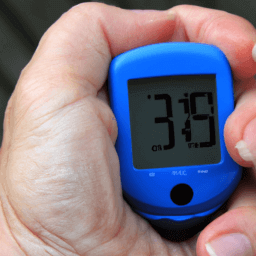How accurate is a Pulse Oximeter
A pulse oximeter is a medical device used to measure the oxygen saturation level in the blood. It is a non-invasive and painless way to measure the oxygen level in the body. The accuracy of a pulse oximeter depends on several factors, including the quality of the device, the placement of the sensor, and the patient's condition. Generally, a pulse oximeter is considered to be accurate within 2% of the actual oxygen saturation level. However, there are certain conditions, such as low blood pressure, anemia, or poor circulation, that can affect the accuracy of the readings. Therefore, it is important to use a pulse oximeter in conjunction with other clinical assessments to ensure accurate diagnosis and treatment.
How Accurate is a Pulse Oximeter?
A pulse oximeter is a medical device that is used to measure the oxygen saturation levels in the blood. It is a non-invasive and painless way to monitor the oxygen levels in the body. The device is commonly used in hospitals, clinics, and homes to monitor the oxygen levels of patients with respiratory problems such as asthma, COPD, and pneumonia. But the question is, how accurate is a pulse oximeter?
What is a Pulse Oximeter?
A pulse oximeter is a small device that is clipped onto a person's finger, toe, or earlobe. It uses light to measure the oxygen saturation levels in the blood. The device emits two types of light, red and infrared, which are absorbed differently by oxygenated and deoxygenated blood. The device then calculates the oxygen saturation levels based on the difference in absorption.
Factors that Affect the Accuracy of a Pulse Oximeter
Several factors can affect the accuracy of a pulse oximeter. Some of the most common factors are:
- Body temperature
- Motion
- Nail polish
- Low blood pressure
- Anemia
- Carbon monoxide poisoning
These factors can affect the accuracy of the pulse oximeter because they can interfere with the absorption of light by the blood. For example, if a person has low blood pressure, the blood may not be able to absorb as much light, which can result in an inaccurate reading.
Accuracy of Pulse Oximeters
The accuracy of pulse oximeters can vary depending on several factors, including the type of device, the quality of the device, and the patient's condition. In general, pulse oximeters are considered to be accurate within 2% to 4% of the actual oxygen saturation levels.
However, some studies have shown that pulse oximeters can be less accurate in certain situations. For example, a study published in the Journal of the American Medical Association found that pulse oximeters were less accurate in patients with dark skin pigmentation. The study found that the pulse oximeters were more likely to overestimate the oxygen saturation levels in patients with dark skin pigmentation.
Conclusion
In conclusion, pulse oximeters are generally considered to be accurate within 2% to 4% of the actual oxygen saturation levels. However, several factors can affect the accuracy of the device, including body temperature, motion, nail polish, low blood pressure, anemia, and carbon monoxide poisoning. It is important to use the device correctly and to take into account any factors that may affect the accuracy of the readings.
| Factors that Affect the Accuracy of a Pulse Oximeter | Accuracy of Pulse Oximeters |
|---|---|
| Body temperature | Generally accurate within 2% to 4% |
| Motion | Generally accurate within 2% to 4% |
| Nail polish | Generally accurate within 2% to 4% |
| Low blood pressure | May affect accuracy |
| Anemia | May affect accuracy |
| Carbon monoxide poisoning | May affect accuracy |
| By www.zelect.in | |
Sharing is caring!
Facebook Twitter Email
Recommended articles for Pulse Oximeter
Pulse Oximeter types and buying guide
-
Pulse oximeter buying guide. How to choose the right oximeter
-
What is a Pulse Oximeter
-
What are the Pulse Oximeter types. Which one is best?
-
What is the normal oxygen saturation on Pulse Oximeter
-
Which brand is best for Pulse Oximeter India
-
Does a Pulse Oximeter measure blood pressure
-
Does a Pulse Oximeter measure heart rate
-
Does Apple watch have Pulse Oximeter
-
How accurate is a Pulse Oximeter
-
What are the 2 readings on a Pulse Oximeter
-
Which finger to use for Pulse Oximeter
-
What does a Pulse Oximeter measure
-
What is a normal oxygen saturation reading on Pulse Oximeter
-
Can Pulse Oximeter detect sleep apnea


